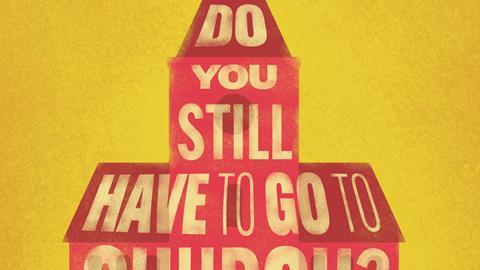Recent trends suggests Christians are leaving behind more traditional expressions of church. Could God be doing something new?
When my husband and I moved to Cornwall 20 years ago, we found our church before we found jobs or somewhere to live. We’ve been part of the same congregation ever since. Despite its many flaws, I am passionate about the local church, and feel deeply committed to it. But increasingly, it feels like we are in a minority.
Covid-19 accelerated the decline in traditional church attendance (data from the CofE showed it lost one in five of its Sunday worshippers during the pandemic); the 2021 census revealed that Christianity is now a minority religion in England and Wales. Personally, I have a growing number of friends and acquaintances who love Jesus but no longer go to church. These are people from different denominations, many of whom have been in leadership or served faithfully in church for years. They have not deconstructed their faith or walked away from it; God’s presence is clearly, supernaturally and beautifully evident in their everyday lives.
For me, there’s immeasurable value in committing, weekly, to spending time with a group of people you would not necessarily choose to hang out with, worshipping and growing in faith together. But for others, the local church no longer feels fit for purpose. Christians stop attending gathered, traditional expressions of church (and I include my own Pentecostal, evangelical denomination within this category) for many reasons. Burnout and busyness, differences in theology, abuse scandals and things that should never happen inside a building where everybody says they love Jesus. For some, Covid-19 was the first time that the ride stopped long enough for them to get off. Many chose not to get back on.
What’s happening?
I wanted to dig deeper into the reasons people leave, and also re-examine some of my own assumptions. What does the Bible actually say about Church and how we should belong to it (or be it)? What could I learn from Christians who are not part of a gathered, regular community? How do we facilitate things like food banks, youth clubs, coffee mornings and pastoral care if everyone meets in tiny groups in people’s homes?
You can’t be a disciple of Jesus without some form of Christian community
And perhaps most pertinently of all, is God doing something new? And is that ‘something new’ happening outside of our existing church structures? After all, during lockdown, internet searches for ‘prayer’ went through the roof, and barely a month goes by without news of a prominent conversion, whether its former atheist Ayaan Hirsi Ali or, more controversially, Russell Brand (see p10). Is the former editor of this magazine, Justin Brierley, right to herald a “surprising rebirth of belief in God” as he did in these pages some months ago?
Growing together
In John Mark Comer’s critically acclaimed book Practicing the Way (Form), the US-based pastor pulls no punches: “You cannot follow Jesus alone”, he declares.
Not “shouldn’t”.
“Cannot.”
The Bible talks a lot about Christian community. From the oft-quoted Acts model of Church (see Acts 1 and 2) to the almost-60 “one another” commands in the New Testament, it is clear that the Christian life is not meant to be a solo activity. As Steve Ainsthorpe points out in The Invisible Church (Saint Andrew Press), when Jesus teaches us how to pray, he begins: “Our Father…” When describing the life of a disciple of Christ, the Bible chooses the analogy of a body, interdependent parts of one whole, called to celebrate one another’s differences and care for those parts which need more protection.
But what does this mean in practical terms?
“You can’t be a disciple of Jesus without some form of Christian community,” says Phil Knox, evangelism and missiology specialist at the Evangelical Alliance.
Knox regularly attends a local church, and wholeheartedly believes that “discipleship equals community, no matter what the cost”. He views his weekly commitment to a congregation as a positive counter to the idol of comfort and the echo chamber of personal choice, while also recognising that it can be “flippin’ hard work”.
In a recent Premier Christianity poll, nearly a third of those who reported attending church regularly said one of their biggest challenges was not always agreeing with what is said from the front. But what if this challenge is also a blessing?
Elizabeth Oldfield, host of ‘The Sacred’ podcast and author of Fully Alive (Hodder & Stoughton) lives in a shared Christian community but chooses to worship at her local parish church. Why, I ask her, given they have their own chapel space and already live by intentional rhythms of prayer, worship and discipleship? “Frankly, I need to be with people who disagree with me,” she replies. “If we just gather people around our table, it would probably look quite a lot like us.” She contrasts this with church, where she worships alongside people she is “radically different from”. In her book she describes this as her “weekly dose of pride-prevention medicine”.
I know what she means. Like a real, nuclear family, committing to a group of people I have not chosen comes at a cost. But it is one that I am increasingly convinced has immense value. “As iron sharpens iron, so one person sharpens another”, says Proverbs 27:17. In other words, we need people who rub us up the wrong way sometimes in order to become better versions of ourselves; to reveal our blind spots and introduce us to new ideas and ways of thinking.
Doing it for the kids
Another reason why mature Christians are stepping away from traditional forms of Church is because of the wealth of online material they can easily access. Why commit to turning up to a building at 10am on Sunday morning when you can watch a far more gifted preacher on YouTube from the comfort of your home? Stephen (name changed) who attends what he calls “a large, attractional church” in London, has been wrestling with this since lockdown.
One the one hand, he recognises that “doing church at home” is “very insular” and “doesn’t include community”. But he also has serious questions about the well-resourced churches whose services can come across as “formulaic” and who seem to value professionalism and slick production over the messy freedom of congregational input. The church that he grew up in, he tells me, was different: “If you wanted to start a song, you just started singing it. There’d be a time for people to share Bible verses or prophetic words in every service. If Church was like that, I would buy into it a lot more.”
So why stay where he is? For Stephen, it comes down to collective family decision-making. For a while, he did church at home, alone, while his wife took their children to a weekly gathering. Eventually, they concluded that they needed “to do church properly together as a family”. Stephen recognises that his own experience of being in a “fantastic youth group” was the making of his faith, and, while he has no wish to outsource his children’s spiritual development to paid youth workers, he and his wife have concluded that it’s better for them all to “be part of the [church] community”.
“That’s why, really, I still go to church on a Sunday. If it wasn’t for the kids, there’s no way I’d be doing that.”
Others I spoke to echoed these sentiments. Tiva and Sara Daka planted and led a church for seven years before handing over the leadership and moving into an intentional Christian community. At first, not being part of a regular local church was a much-needed recalibration. The demands of leadership had often come “at the detriment of family” says Tiva, leaving the couple asking questions of what church demanded. What is the point, he asks, of “discipling other people if your own children are not really walking in the ways of the Lord?”. When they stepped down, Sara admits she felt like she’d got her husband back.
After a time away from church, the Dakas are now dipping their toes back into a weekly congregation. Like Stephen, their primary reason is their children. “We really wanted our children to be part of a church community where they can build friendships”, they explained.
Going deeper
Tiva and Sara still have concerns about the direction that traditional Church is heading. The couple have a heart for cross-denominational prayer and worship and established a 24-7 prayer room in their old church. But they felt they were “hitting an invisible ceiling” trying to pioneer something new while leading within a denomination. It was difficult to get buy-in from other churches who were suspicious their flock might “defect”, says Tiva and, at the same time, they “started to get frustrated with how much of our energy was gearing towards the Sunday”, despite them actively trying to foster a more holistic approach to Christian life.
As their church plant grew, it became harder to maintain deep relational connections. Doing real life together – including all the hard parts – is what they wanted from Christian community but could not find the time for while running a traditional Sunday gathering. It was one reason they were drawn to living in community for a time. “When you read about the early Church in Acts, they were in and out of each other’s homes daily, breaking bread – there would’ve been grit to deal with. The thing about the church models we know is that it’s very easy to just duck in and duck out. Even in a home group, you can share what you want to share. But living with one another? You can’t escape that,” Tiva says. You don’t have to live together to get that experience but, in larger gathered church settings, that intimacy can be hard to maintain, he tells me.
It is often assumed that those who leave church have allowed themselves to drift, or unfairly taken offence over some minor issue and walked out. Yet no one I spoke to fell into these categories. Ainsthorpe’s research – as well as others such as the Church Leaving Applied Research Project – shows that most who stop attending a congregational church do so thoughtfully, prayerfully and, often, with heavy hearts. It’s rarely because they don’t value Christian community. “On leaving a traditional congregation, the first thing many do is seek out opportunities for meeting with other believers. Ironically, some of the most common reasons given for their reluctant departure from congregational life relate to the frustration and disappointment of not finding there the very qualities extolled in the New Testament,” explains Ainsthorpe.
For Stephen, who moved onto a housing estate with his family in order to be a missional Christian presence in the local community, the patterns of Sunday-centric gathered church simply do not match up with what he understands whole-life Christian faith to be about. He’s not “anti-Church”, he insists, but he is “very anti-Sunday morning for the sake of it”. Instead, his small group is where he finds most life: “Eight of us meet together every Tuesday. We pray, we journey together, we learn together. That, for me, is church.”
Radical change
John McGinley, an Anglican minister for more than 27 years, heads up Myriad, a movement set up by the Gregory Centre for Church Multiplication, and which has a vision to establish 10,000 new worshipping communities in the next ten years. To achieve this, McGinley argues we need to “do things in a radically different way”. Whereas traditional congregations, led by paid staff, come with rotas, programmes and infrastructure that all need resourcing, small gatherings of Christians meeting in homes are lightweight, agile and responsive. In the Global South, he explains, this is how the majority of churches are structured – and they are experiencing rapid growth.
Is there really a need for a Sunday morning with a big screen, lights and electric guitars?
But don’t small, home-based gatherings often lack oversight and accountability? How visible are they to the local community? Do they have the resources to pioneer social action projects such as food banks and toddler groups? McGinley is quick to point out that networks such as Myriad can help fill in these blanks, offering support and safety mechanisms while still facilitating the speed of trust that allows small groups to grow. If they work well, he adds, members are aware of – and can easily respond to – local needs.
McGinley has planted a small afternoon gathering out of his local Anglican church. It meets in his home, is “predominantly set around sharing food” and is much more organic and embedded in the community, he says. “There isn’t a rota in sight,” he adds with a smile. It’s not about “producing high quality resources and presentations, but sharing hearts and lives in the presence of Jesus, and believing that if we invite him into that, he does show up and he does make a difference”.
Pioneering people
When Covid hit, the church that Andy and Kate had been attending was going through a leadership transition. Suddenly, being at home on a Sunday morning gave them precious extra time with their four teenagers, as well as space to think and reflect. Bereft of rotas and responsibilities, Andy likens it to the crisis some experience on retirement. As Ainsthorpe puts it in his book: “with identity no longer propped up by the scaffolding of organisational roles, a refocussing occurs”.
For Andy, this meant “being honest” about his questions and discomfort with what he was observing in the Church. Andy worries that the Church has become “too dependent on people in positions of leadership”, which can have catastrophic effects when leaders let people down, hurt or abuse them. The Church structures we now have, he says, are “in real danger of becoming something it was never supposed to be…not an unbiblical model, but a model that isn’t conducive to the purpose of community”.
The couple have had difficult experiences of church breakdown before and have seen the damage it can cause. “Church is fundamentally relationship, with God and with each other,” Kate says, “a safe place where the broken come to be healed” but this hasn’t always been their experience. Because of that: “there was a season where I just needed to step back from church to regain some clarity for my own heart.” But both she and Andy also worry about the impact this has had on their children.
Andy says he is used to feeling slightly on the outside of traditional Church – and, in many ways, he is happy there. Kate, deeply prophetic, has also felt misunderstood and not always empowered to use her gifts to the full. Despite decades of serving on worship teams and in ministry – “always being the first ones there and the last ones out” – church has not always felt like an easy fit.
This seems to be a common experience for those with apostolic, prophetic or evangelistic gifts. “The set-up of most of the established Church is geared around a pastor-teacher model,” says Matt, who has been an ordained minister for 13 years. But often, he says, the other aspects of the five-fold ministry gifts listed in Ephesians 4:11 – evangelist, prophet and apostle - are not so easily accommodated.
After discerning God’s leading, Matt and his wife, Sally, stepped aside from leading a church earlier this year to pioneer a monastic farm built around rhythms of prayer and worship, sharing resources and working the land. “Matt naturally isn’t a pastor,” Sally says. “He’s an apostle.” They describe themselves as “totally committed to the concept of Church”, but they have found that being forced into roles that weren’t their primary calling created a “clash of cultures”. Ainsthorpe writes about these church models as “modal” (“committed to pastoring, teaching, caring and nurturing faith” and “sodal” (“which emphasise sending and pioneering”). In order to be truly effective, the Church needs both, he argues, but many modern structures seem to emphasise the former, leading to those who are more apostolic or missional often becoming frustrated.
Like Tiva, Matt also views the wrestling over theological differences within and between denominations as problematic, and not representative of what the Church is called to be. He is also concerned about state interference. “There will come a point where we won’t be able to meet as Sunday church,” he says. “Covid showed that, overnight, the government could shut it down.” Instead, Matt thinks God is doing a new thing, raising up pioneers “to put an underground framework in place” that can continue, much like the persecuted Church, in spite of whatever challenges may come.

Coming together
Matt and Sally’s children still attend youth group, and the eldest still serves on a Sunday. Like everyone I interviewed, despite the challenges and misunderstanding they have faced, they remain deeply committed to living a life more closely with Jesus.
“For us, it was never: ‘Let’s just throw the baby out with the bathwater and do away with a big Sunday gathering’,” says Matt. “It was: ‘Let’s explore what church could look like around the small, in the home, the values that were really important to us when we first planted an expression of Church back in 2012.’”
Kate agrees. She and Andy now attend a small house church whose weekly rhythms include a football night and an open mic jam night in a local pub, as well as a Sunday morning meeting “for those that are hungry for a little bit of word and worship”.
Church is fundamentally relationship with God and with each other
“The more I’ve journeyed with ‘church’, the more I see the beauty of every expression”, she says. We need the big church experiences, but we also need the embedded, relational, incarnational models.
Others are less ambiguous: “If, this Sunday, every person who said: ‘I’m a practising Christian’ went to church – committed to weekly being part of that, not just on Sunday, but in every iteration of the word, the UK would be a different place overnight,” says Knox, laying out his challenge early on in our interview.
In contrast, Stephen counters that: “If every Christian lived their life the way the early Church did – the way Jesus called us to – would there really be a need for hundreds of people to meet on a Sunday morning and have words on a big screen, lights and electric guitars? No, because we’d be doing church together in our homes, making sure that all of the people around us were invited into this amazing gift that we’ve been given through Jesus.”
They are both compelling calls to action. So, which is the right way?
Increasingly, this journey has shown me that there is no single answer. It seems undeniable that there is a reckoning taking place within our more traditional church structures, but there are also pockets where God is clearly doing a new thing.
There are also challenges for those of us still involved in local, gathered church. How deep are our relationships? Are we doing our best to be a place that is healthy, safe and responsive to the leading of the Holy Spirit, that enables and empowers the whole body of Christ to minister and grow? And how well do the rest of our lives reflect that call to live intentionally with Christ and in close community with those around us?
“We’re not going to ever see it perfectly this side of eternity,” says Andy. “We only see through a glass dimly. It’s like the Jewish midrash of a multifaceted diamond. We’re both looking at it and saying: ‘It’s so beautiful!’ but you’re looking at one element and I’m looking at another.”
“Church is what occurs when people are touched by the living Christ and share the journey of faith with others”, concludes Ainsthorpe. “Whether that occurs in an historic building, online or…wherever, is unimportant.”







































No comments yet